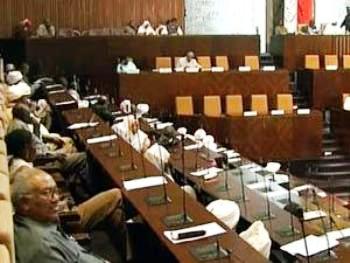Sudan’s 2013 budget submitted to parliament containing increased fees to cover subsidies
December 5, 2012 (KHARTOUM) – The Sudanese parliament today received the 2013 budget proposal from the government that includes hikes on federal car licensing fees drawing criticism from lawmakers.
 The government defended the measure saying that it is necessary to cover part of the fuel subsidies which is now flirting with 5 billion pounds according to remarks by the finance minister this week.
The government defended the measure saying that it is necessary to cover part of the fuel subsidies which is now flirting with 5 billion pounds according to remarks by the finance minister this week.
Under the proposed budget licensing fees for cars with less than 1,000cc will now be 50 pounds; between 1,000cc-2,000cc to 200 pounds; 2,000cc and above at 250 pounds.
But MP Babiker Mohamed Tom criticized the increase saying that it amounts to double taxation asserting that it is in essence a state fee adding that it will impact transportation prices for ordinary citizens. He said an alternative would be to bump value added taxes on Telecom.
Tom also pointed out to an increase in airport exit fees from 35 pounds to 50 in the budget.
The government said that the 2013 budget projects 25.2 billion Sudanese pounds (SDG) in revenues and 35.0 billion SDG in expenses leaving a deficit of 10 billion SDG ($1.5 billion) which equals 3.4% of the country’s Gross Domestic Product (GDP).
The deficit will be financed up to 87% (7.6 billion pounds) from domestic sources including 2 billion SDG from the central bank.
The budget allocates 555 million SDG for health and education sectors, 8.6 billion SDG for security, 60.0 million SDG for agriculture and 1.5 billion SDG for what is known as “sovereign sectors” which includes presidency, council of ministers, foreign ministry, justice ministry, defense ministry and federal affairs ministry.
The fees to be received from South Sudan for exporting its oil through Sudan’s pipelines are not included in the 2013 budget. Khartoum has yet to give the green light to Juba to resume its oil production citing the need to implement security agreement first.
The government is looking to completely phase out subsidies but has yet to announce a timeframe. This summer certain subsidies on food and fuel were partially lifted drawing rare but small anti-government demonstrations.
Sudan is subject to comprehensive U.S. financial and economic sanctions and is unable to borrow from international institutions or rich western nations due to arrears and its hefty external debt. Oil-rich Arab Gulf nations have been reluctant to adequately assist Sudan despite Khartoum dispatching delegations over the last year.
The Sudanese government’s strategy to overcome the secession of the oil-rich South Sudan last year is based on boosting gold exports and expanding oil exploration efforts.
The finance minister said that Sudan’s oil production will reach 150,000 barrels per day (bpd) from 115,000 bringing $300 million in revenues.
He added that gold exports reached between 47 and 48 tonnes by November and were expected to rise above 50 tonnes annually, bringing in more than $2 billion a year.
But according to Reuters some analysts question the accuracy of official forecasts as too optimistic, and say Sudan will struggle to stabilize its economy without collecting oil fees from landlocked South Sudan.
(ST)
